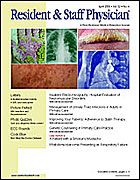Sweet Hours of Sleep
Howard M. Spiro, MD, Professor Emeritus, Department of Medicine, and Program for the Humanities in Medicine, Yale University School of Medicine, New Haven, Conn
Behind that old veil of ignorance that John Rawls pulled over the wise people he hoped would establish a just society, if you were thinking about how long interns and residents should work at one shift, what would you decide? Common sense would probably aim you at eight hours, or at the most ten, as the limit.
Furthermore, you might decide that the number of hours should be tailored to the work that is to be done. For the stress of intensive care units (ICUs), the period might be shortened; for outpatient work, a longer time may not seem unjust. "They also serve who only watch and wait," but eight hours at a desk leisurely talking over medical concerns takes less out of you than caring for desperately ill patients. That's why the elderly physicians should see outpatients while the young care for the very sick.
eu
dis
Of several different kinds of stress, stress, the exhilaration of the strong man or woman ready to run the race, is quite different from the tress of caring for the dying. Eustress is brief and builds, whereas chronic stress tears down. To conclude that shorter hours bring better performance needs little more than common sense and experience.
So why all the studies? It must have to do with the search for "evidence-based medicine." Since the drive to shorten work hours in hospitals began some years ago—in my opinion belatedly—a lot of folks have recalled the knightly vigils of medicine. In the 1940s, residents from my generation worked all hours and were "on call" every other night. We look back with delicious nostalgia at our dedication. Forgotten is the relatively leisurely pace of those days. At the old Peter Bent Brigham Hospital, the site of some new studies that I will comment on, our evening hours were spent talking with each other and with the chief resident, strolling around the wards inquiring about bowel movements and at worst waking up every four hours to put an intravenous line with heparin into someone with a heart attack. We rarely were up all night, and we spent more time in the cafeteria jimmying open the ice cream stores than working on the wards.
New
England Journal of Medicine
So it was not surprising to read recently in the two papers, both from the renamed Brigham and Women's Hospital, praising the benefits of reducing the interns' work hours. The first paper concluded, "Eliminating interns' extended work shifts in an intensive care unit significantly increased sleep and decreased attentional failures during night work hours."1 The second more portentously observed, "The rates of serious medical errors in two ICUs were lowered by eliminating extended work shifts and reducing the number of hours interns worked each week."2 Buttressed by charts and graphs, the limitations were carefully dissected, and implications only cautiously advanced. That more studies needed to be done provided a final fillip.
not
Both articles provide further evidence of how long physicians should work. Whether the authors sitting in rocking chairs would have come up with equally salubrious conclusions without all the expense and numbers and measurements seems likely. It will be argued that numbers are needed to convince the Establishment; action may be more important than evidence at this point. Psychoanalysts and deconstructionists will have a heyday figuring out why the medical profession, at the height of its power and prowess, so resists changes that might improve the health and welfare of us all.
N Engl J Med
1.Lockley SW, Cronin JW, Evans EE, et al. Effect of reducing interns' weekly work hours on sleep and attentional failures. . 2004;351:1829-1837.
N Engl J Med
2. Landrigan CP, Rothschild JM, Cronin JW, et al. Effect of reducing interns' work hours on serious medical errors in intensive care units. . 2004;351:1838-1848.
